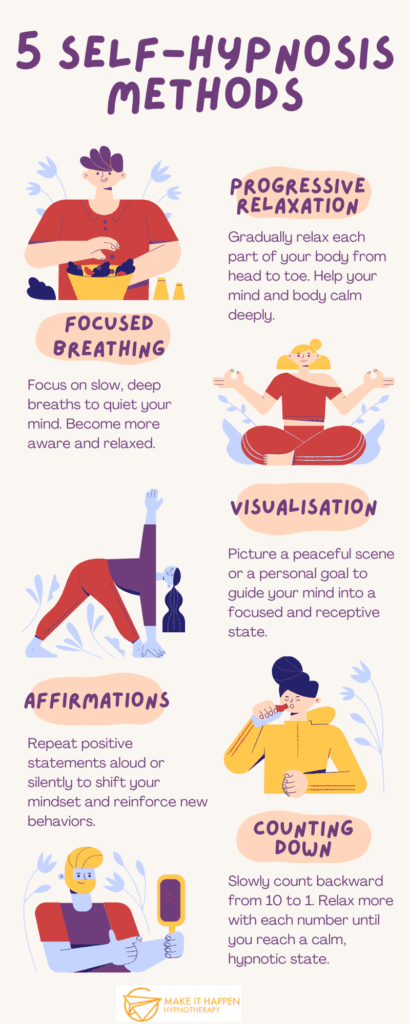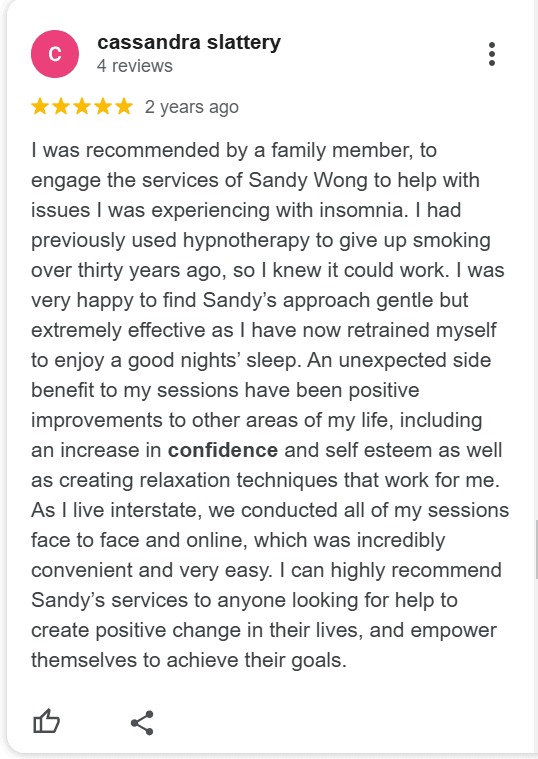Can you not stop criticising yourself? Do you hesitate in doing something new because you think you can’t do it? Do you often think “How to stop negative thoughts”? Good news: You can break out of these mental blockages through hypnotherapy. How? By reading this blog post until the end.
Why Does Your Mind Repeats Negative Thoughts?
It happens because of a phenomenon called Negativity Bias. Your brain gives more attention and weight to negative events and thoughts compared to positive ones.
You remember bad experiences, hurtful words, and stressful situations more than good ones. As a result, negativity repeats itself more. It can become a part of your core beliefs about yourself and the world.
Physical Interpretation
Additionally, negative thoughts and emotions can activate the amygdala. It helps you in processing emotions and survival responses.
Once the amygdala is activated, it can cause a cycle of negative thinking that is difficult to break out of.
Why Does it Happen
- It helps you survive better. Your brain can recognise and protect you against threats that way.
- It allows the brain to work more. Your brain loves to criticise and process information. Negativity builds stronger emotions and critical analysis than positivity.
- Your brain works more to be positive. Again, it loves working. You must exercise your brain a bit more to bring positive thoughts at the front of your mind.
Types of Negative Thoughts That Make You Question Yourself
Negative thinking makes you sad, anxious, stressed, and angry. It can plummet your self-esteem and confidence. You may not be able to complete your goals.
How to stop negative thoughts? You must know about their types first. The commonest negative thinking patterns are:
- Automatic Negative Thoughts: These are random bad thoughts that you think automatically. You don’t have to make an effort to bring them into your mind. They are often negative and difficult to push away.
- Intrusive Thoughts: These thoughts come to your mind even if you try to force them out. They might tell you horible things about yourself like, “You are a loser!” or “Why do you always mess up?” You can become very disturbed and stressed.
- Negative Self-Talk: It is when you talk to yourself in a negative way. such as telling yourself that you are not good enough, or that you will never succeed.
How to Stop Negative Thinking in 4 Steps
It is hard to think positively if you have been thinking negatively for a long time. However, you can do it with these four steps:
1. Be Mindful of Your Thoughts:
You must catch yourself whenever you have negative thoughts. Being mindful of your thought processes can make you more self-aware.
As a result, you can plan effective strategies to change them.
2. Challenge Negative Self-Talk:
Remember that you are in control of your thoughts. If you notice negative self-talk, think “What if it is not true?”
You must challenge the validity of negative thoughts by asking yourself, “What if the opposite were true?”
For example, if you think, “I can’t do it,” you could ask yourself, “What if it is not true? What if I can do it?”
This can help you consider alternative POVs which might be positive.
3. Consider the evidence:
Once you challenge negative self-talk, you must bring facts to support positive thoughts.
Why can you do it?
Have you done it before? What was the result?
If the result was good, ditch the negativity. If the result was bad, consider different theories about how you can make it better this time.
4. Broaden your POV:
This can help you shut out your negative thoughts.
It means that you must think of a positive thought every time toxic thoughts overwhelm you.
You can ask yourself open-ended questions like
- “Why is this thought correct?
- “Why is it incorrect?”
- “How to stop negative thoughts?”
This can help you consider a wider range of possibilities and challenge negative thoughts more effectively.
Hypnotherapy Can Help You Practise These Steps
This treatment method can be highly effective in helping you get rid of negative emotions.
What Is Hypnotherapy?
It is a therapy that uses hypnosis to help you reach into your unconscious mind. You can make positive changes to your behaviours, thoughts, and emotions.
Hypnotherapy can give you a satisfactory answer on how to stop negative thoughts. It helps you rewire your brain by reprogramming the subconscious.
Isn’t it difficult, though? Not really, if you are willing.
Your subconscious mind stores automatic thoughts, feelings, and built-in behaviours. You cannot change them through your conscious mind.
Why? Because you don’t know they are stored in the first place.
Hypnotherapy Changes Your Subconscious
The subconscious mind doesn’t usually listen to rational thoughts and logic.
It can respond to suggestion and visualisation, though. That is how to stop negative toughts. Hypnotherapy uses these methods to replace your negative thoughts with positive ones.
Fascinating how imagining a scene can take you inside your subconscious mind, isn’t it?
Subconscious-level changes can be more long-lasting because they become your automatic thought processes. So, positive thoughts might come as naturally to you as negative ones did before.
MIHH Uses Hypnotherapy as a Holistic Approach
So, we are your best choice.
While hypnotherapy is “Thor” on its own, it becomes the “Avengers” when combined with other treatment methods. We at Make It Happen Hypnotherapy (MIHH) know it and practice it regularly.
Hypnotherapy and Cognitive Behavioural Therapy (CBT)
How to stop negative thoughts? CBT helps you recognise and resolve your pessimistic emotions and behaviours.
Your therapist can help you understand exactly why you think like that. As a result, you can replace them with positive behaviours easily.
When Hypnotherapy and CBT are combined, you can stop negative thoughts both subconsciously and consciously.
For example, hypnotherapists can use mental rehearsal. This helps you imagine positive outcomes. You can visualise yourself successfully handling difficult situations.
You can become more positive if you keep practicing replacing your thoughts.
Mental rehearsal is useful if you have anxiety. It can help you prepare for challenging situations and reduce their feelings of anxiety.
Also, we Help You Learn Self-Hypnosis
Another reason for you to choose us. We want you to become as independent in self-recovery as possible.

How Client C. Became More Confident With us
Cassandra hesitated in taking initiatives. She had self-doubt and thought everyone will make fun of her. She didn’t know how to stop negative thoughts.
Here is her confident feedback after taking sessions with us:

In a Nutshell
How to stop negative thoughts when you cannot think anything positive? Hypnotherapy answers this question by helping you change your negative subconscious emotions. You can become more positive and optimistic. If you are ready for change, call 047-515-9415 to book a FREE Strategy Call with us and learn more.
Frequently Asked Questions
What Is the Success Rate of Hypnosis?
The success rate of hypnosis can vary depending on a variety of factors.
- You must be ready to change
- The hypnotherapist’s experience
- Goals of hypnosis sessions
Can Hypnotherapy Help With Alcoholism?
Yes, it can.
Alcoholism mostly happens because of negative thoughts, i.e. low self-esteem, anxiety, and depression. These negative emotions makes it difficult for people to change their behavior through conscious effort alone.
Hypnotherapy can help you make positive changes to your subconscious thoughts, beliefs, and behaviours. You can replace them with positive feelings because you know how to stop negative thoughts. You can also develop coping strategies to deal with triggering situations.
What Causes Hypnosis to Fail?
It might fail because of:
- Lack of motivation or commitment: Hypnosis requires active participation and effort from the individual. If someone is not motivated or committed to making changes, hypnosis is unlikely to be effective.
- Lack of trust in the therapist: For hypnosis to be effective, the individual must have trust and confidence in the therapist. If there is a lack of trust or a poor rapport between the individual and therapist, hypnosis may not be effective.
- Lack of practice: For hypnosis to be effective, it often requires repetition over time. If an individual does not practice self-hypnosis or receive regular hypnotherapy sessions, the changes made during hypnosis may not be sustained.
- Lack of self-help tools: Hypnosis is just one tool for personal growth and behavior change. If an individual does not have access to other self-help tools or strategies to maintain the changes made during hypnosis, the changes may not be sustained.
- Unresolved underlying issues: Hypnosis can be effective in addressing specific behaviors or habits, but it may not be effective in addressing underlying emotional or psychological issues that contribute to the behavior.
- Expectations and mindset: An individual’s expectations and mindset can influence the effectiveness of hypnosis. If someone expects hypnosis to fail or is resistant to the idea of hypnosis, it may not be effective.








